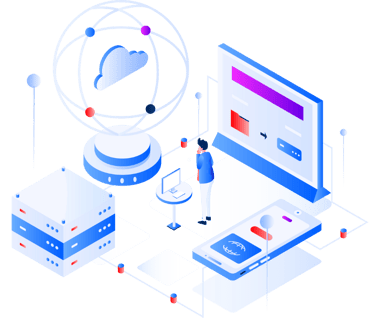
7 frequently asked questions about AI for business
AI, or artificial intelligence, is a theme more topical than ever. We see and hear how AI-based tools are automating and revolutionizing tasks and businesses. But as with any new technology, AI brings many questions. In this blog post, we have collected 7 of the most common questions entrepreneurs and businesses ask (or should ask) about AI.
How can AI and ML be used to improve business?
There are many ways that artificial intelligence (AI) and machine learning (ML) can be used to improve a business. Some potential applications include:
- Personalization: AI and ML can be used to personalize products and services based on individual customer needs and preferences. This can lead to increased customer satisfaction and loyalty.
- Automation: AI and ML can be used to automate routine tasks, freeing up time and resources for more value-creating activities.
- Predictive analytics: AI and ML can be used to analyze data and make predictions about future trends and customer behavior. This can help companies make more informed decisions about product development, marketing and sales
- Customer Service: AI and ML can be used to improve customer service by providing quick, accurate responses to customer inquiries and requests.
- Logistics and supply chain optimization: AI and ML can be used to optimize the logistics chain, including forecasting demand, optimizing inventory levels and identifying bottlenecks.
Do I need AI to stay competitive?
Whether a company needs to use artificial intelligence (AI) to remain competitive depends on the specific industry and market in which it operates. In some industries, the use of AI may be necessary to keep pace with competitors and meet customer expectations. In other industries, the use of AI may not be as critical.
That said, the adoption of AI is increasing across a wide range of industries, and it can offer a number of benefits, such as improving efficiency, automating routine tasks and enabling businesses to make more informed decisions. As such, it is worth considering whether AI can be used to improve your business and help you remain competitive.
It is also worth noting that the use of AI does not necessarily mean that a company needs to build and maintain its own AI systems. There are many AI-powered products and services available in the market that companies can use to access the benefits of AI without having to invest in expensive in-house development.
What are the costs and benefits of implementing AI and ML?
The costs and benefits of implementing artificial intelligence (AI) and machine learning (ML) will vary depending on the specific business and the specific AI and ML systems being implemented. Some potential costs of implementing AI and ML include:
- Hardware and software costs: Depending on the complexity of the AI and ML systems being implemented, there can be significant costs associated with purchasing and maintaining the necessary hardware and software.
- Personnel costs: Implementing AI and ML systems may require hiring specialized personnel, such as data scientists or machine learning engineers, which can be expensive. This point assumes that you as a company do not buy in a service, but develop it yourself.
- Training costs: Employees may need to be trained to use and maintain the AI and ML systems, which may also incur costs. Many services on the market are user-friendly and ongoing maintenance is included in the majority of them. The operation required to maintain good quality should not be underestimated, regardless of whether the company chooses to do it themselves or gets help.
- Integration costs: Integrating AI and ML systems with existing systems and processes can involve additional costs.

Business Cloud iPaaS
Business Cloud is an iPaaS (integration platform as a service) and is used, among other things, for the preparation of data for AI and machine learning. In addition to standardized, updated and secure data in real time, you get integration, monitoring and ongoing updates for a fixed monthly cost.
How can we ensure the quality and reliability of our AI and ML systems?
There are several steps companies can take to ensure the quality and reliability of their artificial intelligence (AI) and machine learning (ML) systems:
- Use high-quality data: The quality and reliability of an AI or ML system is often directly related to the quality of the data used to train the system. It is important to ensure that the data used to train the system is accurate, relevant and free of errors.
- Use selected algorithms: Choosing the appropriate algorithm for the task at hand is critical to ensuring the quality and reliability of an AI or ML system. It is important to carefully consider the strengths and limitations of different algorithms in order to choose the most appropriate one.
- Test and validate the system: It is important to thoroughly test and validate an AI or ML system to ensure that it works as intended and produces accurate results, especially if you develop it yourself. This may involve using test data sets or real data to evaluate system performance.
- Monitor and maintain the system: Ongoing monitoring and maintenance of an AI or ML system is important to ensure its continued quality and reliability. This may involve updating the system as new data becomes available or making changes to the system in response to changing business needs.
Overall, ensuring the quality and reliability of an AI or ML system requires a combination of careful planning, data management, and ongoing monitoring and maintenance. By taking these steps, companies can help ensure that their AI and ML systems deliver the intended results and add value to the organization.
Will AI and ML replace human labor?
Artificial intelligence (AI) and machine learning (ML) have the potential to automate certain tasks and processes, potentially leading to a reduced need for human labor in some industries. However, it is unlikely that AI and ML will completely replace the human workforce in the near future.
Instead, it is more likely that AI and ML will complement and augment human work, rather than replace it entirely. For example, AI and ML systems can be used to automate routine tasks, freeing up human workers to focus on more value-creating activities and analyzing numbers rather than collecting them.
It's also worth noting that developing and maintaining AI and ML systems often requires specialized knowledge and expertise, which can create new job opportunities in fields such as computer science and machine learning technology.
The impact of AI and ML on the workforce is likely to vary depending on the specific industry and the types of tasks being automated. It is important for companies and individuals to stay informed about the potential impact of these technologies on the labor market and to adapt and upskill as needed to remain competitive.
What is the future of AI?
The future of artificial intelligence (AI) is difficult to predict with certainty, but it will likely continue to play a significant role in many areas of our lives. Some potential developments in the AI field include:
Continued Advances in Machine Learning: Machine learning, a type of AI that enables computers to learn from data, is expected to continue to improve, leading to more advanced and sophisticated AI systems.
Increasing use of AI in a wider range of industries: AI is already being used in a variety of industries, including healthcare, finance and transportation. As AI technology continues to improve, it will likely be used in an even wider range of industries.
Development of more intelligent and autonomous systems: AI systems are expected to become more intelligent and autonomous over time, which could lead to the development of fully autonomous robots and other systems.
Increased use of AI for decision-making: AI is expected to play a greater role in decision-making in both business and personal contexts. For example, AI can be used to help with financial investment decisions or to help people choose the best products or services for their needs.
Are there any downsides to applying AI to a business?
Like any technology, artificial intelligence (AI) has both potential advantages and potential disadvantages when applied to a business. Some of the potential disadvantages of using AI in a business context include:
- Cost: Implementing AI systems can be costly, as it can require significant investment in hardware, software and personnel. But with today's range of smart technologies and companies offering services in this area, it doesn't have to be costly if you look at the effect and benefits it has the potential to bring.
- Complexity: Building your own AI system can be complex and requires special knowledge and expertise. It is also required that one or more maintain the system.
- Ethical concerns: AI can raise ethical concerns, such as bias in decision-making, loss of jobs due to automation, and potential misuse of personal data. As a business owner, you are required to keep track of laws and regulate your practices, regardless of whether they are done by a human or an AI system.
- Lack of transparency: AI systems can be difficult to understand and explain, which can make it challenging for people to understand how they make decisions. This lack of transparency can be a problem for companies and individuals who rely on AI systems for important decisions.
It is important for businesses to carefully consider the potential downsides of using AI and to take steps to mitigate any negative effects. This may include asking what the purpose of implementation is, what areas they should cover and what they want to achieve. If it is right for your company, you should review whether it requires investments in training and development for employees, implementing ethical guidelines for the use of AI and ensuring that AI systems are transparent and accountable.
Are you curious about how Business Cloud iPaaS can help your company take the next step towards AI? Or are you an AI company that wants to streamline the implementation of your product at your customer? Contact me below or book a demo and I'll tell you more.

Staffan Hedbrandh, CEO








